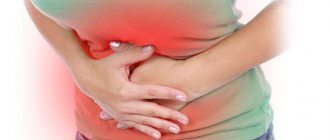Causes of pain and distress
During pregnancy, a woman’s hormonal background changes, therefore, at different stages of gestation, different phenomena in the body can be observed.
Depending on the stage of pregnancy, the reasons for the manifestation of unpleasant symptoms differ. It is important to note that in most cases, the cause of symptoms of gastrointestinal diseases is not pregnancy, but the presence of chronic, previously poorly treated diseases. Therefore, consultation with both an obstetrician-gynecologist and a gastroenterologist is required.
In the early stages
In the early stages of pregnancy, the body does everything possible to prevent miscarriage. With the help of hormonal changes, the uterine muscles relax, and with it the intestinal muscles. This causes constipation and pain in the navel and inguinal area.
Diarrhea is an unnatural phenomenon - it may indicate the following causes:
- exacerbation of gastritis or pancreatitis;
- enterocolitis;
- gastrointestinal infection;
- irritable bowel syndrome;
- poor nutrition;
- stress.
Medicines taken during pregnancy can also cause diarrhea. Often the cause of diarrhea in the early stages is precisely the inflammation of chronic pathologies.
In the later stages
From the third trimester, when the fetus is already quite large, it can put pressure on the intestines along with the uterus. This provokes pain. Since intestinal motility increases, diarrhea occurs.
Otherwise, the reasons do not differ from the early stages: infection, exacerbation of existing diseases, poor nutrition. In any case, diarrhea requires mandatory diagnosis.
How to understand that it is the stomach that hurts?
Before deciding what you can drink during pregnancy when your stomach hurts, it is important to clarify whether it really hurts. It is possible to determine that the pain syndrome develops specifically in the stomach by the localization of the pain, as well as by the accompanying symptoms.
Localization of stomach pain is in the epigastric region, from the end of the esophagus and in the center of the ribs. If the pain goes under the ribs, it can be caused by the duodenum, gallbladder or pancreas. Pain can also be observed in the lower part of the esophagus - this phenomenon accompanies gastroesophageal reflux disease.
Symptoms of stomach problems
Pain is rarely an independent indicator of stomach problems. In most cases, a whole range of symptoms are observed:
- heartburn;
- feeling of heaviness;
- diarrhea or constipation;
- belching;
- flatulence, bloating;
- appetite disorders.
A number of diseases are accompanied by nausea and vomiting, but in the early stages of pregnancy they can masquerade as toxicosis and complicate the diagnosis of the disease.
Another symptom of gastric pathologies can be blood in the stool. This is a symptom of dangerous conditions, so if you find blood in your feces, you should immediately consult a doctor.
What can you take during pregnancy?
Most first-line drugs for the treatment of the stomach are contraindicated during pregnancy. However, symptomatic therapy may be quite acceptable if carried out only as indicated and under the supervision of a physician. Such therapy will help to somewhat delay treatment until the birth of the child and eliminate the symptoms accompanying the disease.
Tolerating pain is strictly contraindicated - deterioration of the central nervous system and constant pain will affect the condition of the child and affect future births.
Approved pain medications
The drugs listed below are the general recommended regimen for pain relief. Taking medications, their dosage and frequency of use are established only by the attending physician, who is familiar with the peculiarities of pregnancy and chronic gastrointestinal pathologies in an individual case.
To eliminate pain as a consequence of the inflammatory process or spasms, the following stomach pills are prescribed during pregnancy:
- Gastrofarm is an anti-inflammatory pain reliever for the digestive tract;
- Papaverine , Drotaverine - antispasmodics that eliminate spasms of intestinal smooth muscles;
- antacids - to remove toxins that cause problems with the digestive tract.
Medicines are prescribed one at a time or in combination, depending on the severity of the pain syndrome that bothers the woman.
Medications for the disorder
Traditional therapy for digestive disorders offers a number of drugs that do not affect the fetus, but improve the condition of the expectant mother.
To eliminate diarrhea, you can take the following medications:
- activated carbon , which removes excess gases and toxins;
- Smectu - the medicine will remove toxins, bacteria, and promote the restoration of mucous membranes;
- Enterosgel is an effective remedy for intoxication, restores the digestive process;
- Rehydron is a water-electrolyte balance restorer.
The latter drug is prescribed in combination with enterosorbents if the diarrhea was prolonged and complicated, and led to the loss of a large amount of water from the body. In other cases, it is recommended to drink plenty of clean water for recovery.
What can you do for gastritis and ulcers?
Classic drugs for the treatment of ulcers and eradication of Helicobacter are prohibited for pregnant women, namely, antibiotics and bismuth preparations. Therefore, ulcer therapy is also symptomatic and is aimed not only at eliminating discomfort, but also at mitigating the course of the disease.
The standard treatment regimen for gastritis and ulcers during pregnancy includes:
- Gastrofarm;
- Maalox , Phosphalugel , Almagel - only under the supervision of a doctor;
- Enterosgel;
- No-Shpa , Papaverine ;
- Motilium.
Each of these drugs can be prescribed separately or in combination. The dosage is determined only by the doctor.
What can pregnant women drink for stomach pain?
The choice of pain reliever for the stomach during pregnancy is limited to the following:
- antispasmodics;
- anti-inflammatory drugs;
- stimulants of gastric motility;
- herbal decoctions;
- folk remedies.
Despite such a narrow range of available methods, you should still choose your medications carefully. Since not all names of drugs belonging to the above categories are suitable for pregnant women.
Among painkillers and antispasmodics, the following drugs are considered safe for the health of the mother and fetus:
If the discomfort is caused by constipation, this symptom can be relieved with laxatives or a special diet. A radical method in the absence of effect from the above medications is microenemas. As a filler for douching, you should use specialized formulations for pregnant women. They can be purchased at the pharmacy.
If a pregnant woman does have an upset stomach, it is permissible to take the following tablets:
- Smecta.
- Activated carbon.
- Enterosgel.
- Hydrovit.
- Regidron.
- Linux.
- Bifiform.
Drugs for treatment are selected individually in accordance with the medical history, the degree of development of the pathology and the presence of other ailments. Pregnant women are prescribed in the following situations:
- Probiotics.
- Phosphalugel.
- Medicinal herbs.
- Mezim.
- Prebiotics.
The doctor selects treatment, coordinating its scheme with the patient’s medical history, lifestyle and pregnancy progress.
Traditional methods of treatment
In the absence of individual hypersensitivity to the components of traditional recipes, pregnant women can use them for stomach pain. The following plants have anti-inflammatory, astringent and analgesic properties:
- chamomile;
- mint;
- flax seeds;
- calamus;
- thyme;
- fennel.
Plantain, yarrow, parsley, and wormwood also have such properties. Teas and decoctions are prepared from them - for each plant, instructions for brewing teas and preparing decoctions are indicated on the pharmaceutical packaging.
Traditional medicine recipes for diarrhea
To eliminate diarrhea during pregnancy, you can use recipes that, according to reviews from expectant mothers, have received the greatest approval:
- rice decoction - boil 5 g of rice for forty minutes in 0.5 liters of water, then strain and cool, take 50-100 ml every three hours;
- pomegranate infusion - leave a tablespoon of pomegranate peel covered in a glass of boiling water, and after cooling, drink instead of tea;
- starch - dilute 5 g of starch in 100 ml of cold water and take up to two times a day;
- herbal tea - brew equal proportions of mint and motherwort according to the instructions, take instead of tea.
It is also necessary to take care of the diet - it should be balanced, fractional and without fast food, spicy, fatty foods.
Nutrition for pregnant women with stomach pain
Stomach pain of a physiological nature does not require treatment, but if it brings significant discomfort, a woman should first reconsider her lifestyle and eating habits. Pregnant women are recommended:
- Follow a regimen of fractional meals (5-6 times a day). In this case, the volume of food should be no more than 200 g at one time.
- Do not eat 3-4 hours before bedtime, and if you are very hungry at night, limit yourself to kefir or fermented baked milk.
- Eliminate sweet, fatty, sour, spicy and overly salty foods from your diet.
- Avoid carbonated drinks and give preference to still mineral water.
- Drink at least 2 liters of water per day.
- Do not eat foods that cause fermentation in the stomach and intestines (legumes, grapes, baked goods, mushrooms, cabbage, canned food, raw vegetables and sweets).
It is not advisable for pregnant women to eat fried foods, as they are difficult to digest and create a feeling of heaviness.
- The healthiest dishes will be those cooked in a double boiler, convection oven or oven.
- Moreover, the fewer spices, the better.
- When consuming freshly squeezed juices, they must be diluted with water to avoid inflammation of the gastric mucosa and, as a consequence, the development or exacerbation of gastritis.
Symptoms of emergency conditions
To prevent serious consequences for the woman and child, it is necessary to immediately contact an ambulance if symptoms of emergency conditions are detected.
These include vomiting and diarrhea that are not stopped by medications, as well as when there is blood in the vomit or feces. Acute abdominal pain and tremors in the limbs also require emergency treatment.
Other symptoms of acute conditions include increased blood pressure due to pain, high body temperature, and clouding of consciousness. Timely assistance can not only alleviate the condition of the fetus and the woman, but also save her from miscarriage and other deadly conditions.
Methods for preventing stomach problems
Directly during pregnancy, you should avoid spicy, fatty foods, foods with preservatives and dyes. Despite the fact that a pregnant woman’s tastes are usually dominated by one type of food, you should not get carried away with its consumption - food should contain all useful elements and substances.
For prevention, vitamins and physical exercises for pregnant women can be prescribed. Overeating and starvation are also unacceptable - it is important to constantly feel a feeling of moderate satiety.
Source of the article: https://gastritunet.online/bolezni-zheludka/syndromy/u-zhenshchin/chto-mozhno-beremennym-ot-zheludka.html
Causes of stomach pain
It is customary to mistake for stomach pain sensations that arise in the epigastric region, but they can also be caused by other causes - dysfunction of the biliary system, pancreas and even kidneys.
Throughout pregnancy, the same reasons can provoke an inflammatory process or exacerbation of chronic diseases as in the normal state:
- stress;
- eating disorder;
- consumption of unsuitable or low-quality products;
- allergies;
- intoxication.
Particular attention should be paid to emotional instability - it is a rare woman who tolerates pregnancy absolutely calmly. She is worried about the condition of the unborn baby, about how the birth will go. Even their own appearance causes distress - some women begin to feel embarrassed about natural changes in appearance, cry, and emotional instability is an impetus for diseases of the gastrointestinal tract.
During pregnancy, you can become infected with the bacterium Helicobacter pylori, get poisoned, your stomach can hurt due to overwork, due to increased stress - the latter is more typical for later stages. At the same time, reflux esophagitis may appear - a disease in which gastric contents, due to the fact that the stomach is constantly being compressed by the pregnant uterus, are thrown into the esophagus.
In the early stages, due to toxicosis, gastritis and peptic ulcers often worsen, and the acidity of gastric juice changes.
Despite the fact that drug treatment for a pregnant woman is undesirable, constant pain has an even more negative impact on the condition of the fetus. The woman becomes irritable, sleeps poorly, refuses to eat - the fetus does not receive nutrients, its formation is disrupted. What can you drink “from the stomach” during pregnancy and what can you do to make the condition return to normal faster?
What stomach medications can you take during pregnancy?
Stomach pain during pregnancy: useful tips
An important period in a woman’s life associated with expecting a baby is filled not only with exciting joy, but also with significant changes in well-being.
Toxicosis of the first half, increased susceptibility to any irritants, anemia, pyelonephritis, are well known to doctors treating pregnant women.
Stomach pain during pregnancy is not a very common phenomenon, but still not uncommon. They are understandable if a woman had gastritis before pregnancy. But if the expectant mother complains of stomach pain for the first time, doctors try to do without medications, postponing finding out the exact causes of the ailment until the postpartum period.
Prevention
Often the cause of painful stomach cramps is physical and nervous stress of a pregnant woman, so it is very important:
- observe the work and rest schedule;
- avoid stressful situations.
If spasmodic pain occurs after exercise, then it is necessary to exclude them, but you cannot completely abandon physical activity, since a sedentary lifestyle contributes to the development of constipation, edema and varicose veins. In this regard, it is recommended to include in your daily routine:
- therapeutic exercises for pregnant women;
- slow walking;
- pool.
A balanced diet is the key to the health of not only a woman, but also her unborn baby, so you should pay special attention to it, giving preference to healthy and high-quality products.
Excluding junk food from the diet for the entire nine months will not only smooth out the symptoms of existing gastrointestinal diseases, but also reverse many pathological processes.
If the stomach pain does not go away and is not relieved with medications, it is necessary to consult a doctor in a timely manner and undergo a diagnostic examination. Early detection of pathology will prevent its further development and avoid serious complications in the future.
A healthy digestive tract is an important condition for a person’s well-being. Discomfort in the abdominal area is familiar to most expectant mothers. If your stomach hurts during pregnancy, this may be due to a natural restructuring of the woman’s body. You need to be able to distinguish functional, transient troubles from symptoms caused by pathologies, and independently alleviate conditions that are not dangerous to health.
Pain in the first trimester
The first trimester is a responsible time. During this period, all the organs and systems of the unborn child are formed, so a woman should be especially attentive to herself.
toxicosis often appears - the woman suffers from heartburn and nausea, dizziness and weakness, and vomiting occurs periodically. The symptoms are quite understandable - a huge “restructuring” is happening in the body - the hormonal background is changing so quickly and significantly that the body is having a hard time.
And no matter how popular “experts” explain that the presence of heartburn is a sign that the child will be born with a hairstyle, this does not make it any easier for the woman. And taste preferences also change - there are many stories about the food whims of expectant mothers. Let's talk about the main causes of stomach pain in the early stages, here they are:
- Toxicosis of the first half.
- Significant dietary violations - abuse of salted, smoked, pickled or rich foods.
- Having gastritis or other gastric diseases before pregnancy.
Taking any medications for heartburn and nausea in the first trimester is strictly prohibited, so we offer some simple tips on how to get rid of pain and nausea during this period.
Tip one - relieve nausea
In order to get rid of obsessive nausea, prepare homemade crackers for yourself.
Cut rye or wheat bread into small cubes, add a little salt and dry in the oven.
If you feel nauseous, dissolve the crackers in your mouth - copious amounts of saliva will help relieve the discomfort.
Sucking on a slice of lemon also helps a lot. Cut the lemon with peel into slices, then into quarters. Sprinkle with sugar and put in a small jar that you can take with you. If you feel nauseous, suck on one or two lobes at a time, it will be easier.
Tip two - getting rid of heartburn
Regular milk will help you avoid heartburn. You need to drink it slightly warmed up, in small sips. If you don't like milk, replace it with boiled warm water or herbal tea, for example, chamomile.
Important! We do not recommend that pregnant women use baking soda if they have heartburn. This product is not safe for the body.
You can get rid of heartburn if you avoid dietary errors.
Make a fractional diet, eat only dietary foods, heartburn will disappear without a trace. Another remedy for heartburn and stomach pain that is not contraindicated for pregnant women is oatmeal jelly. Prepare it correctly and consume it half an hour before meals, digestion will be smooth.
Tip three, antiemetic
Vomiting of pregnant women is considered a companion to early toxicosis and is not considered a pathology. It occurs more often in the morning, immediately after waking up or when brushing your teeth. Form a habit of drinking a glass of water in small sips in the morning. This will make the situation a little easier. It is not advisable to take any medications and it is better if you just endure this period. By 14 weeks, vomiting should disappear on its own.
If hyperemesis develops (uncontrollable vomiting of a pregnant woman), the woman is hospitalized in the pathology department. The task of doctors is to prevent dehydration and weight loss in women.
Important! Any medications during pregnancy are taken strictly as prescribed by the doctor!
stomach medicine during pregnancy
Early toxicosis during pregnancy is a woman’s health disorder associated with the adaptation of her body to bearing a fetus. 6 out of 10 women experience toxicosis in the early stages, but gynecologists do not always consider this condition a disease that necessarily requires treatment. Early toxicosis of pregnancy still has no clearly established causes, and there are no ways to prevent it. The absence of early toxicosis also does not indicate any pathology; some women do not experience it at all.
Causes of early toxicosis
The causes of early toxicosis during pregnancy have not yet been fully studied; several theories are trying to explain it, but all researchers agree on only one thing: it is the presence of the fetus in the uterus that causes the symptoms of early pregnancy. Removal of the fertilized egg leads to immediate cessation of complaints. Most likely, the causes of early toxicosis in pregnant women are caused by neuro-reflex shifts at the level of the diencephalic region of the brain, discoordination of the processes of excitation and inhibition in which occurs due to a violation of neuro-reflex impulses due to the embryo developing in the uterus and the rapidly progressing ingrowth of chorionic villi into the endometrium. It is known that after the formation of the placenta by 11-13 weeks, the unpleasant first symptoms of pregnancy subside, and the condition of the pregnant woman returns to normal.
Signs of early toxicosis
Toxicosis in early pregnancy, the treatment of which requires drug intervention, should pose a threat to the woman’s health. Signs of pregnancy in the early stages in the form of gastroenterological discomfort must be distinguished from real early toxicosis during pregnancy, which is a serious functional disorder of the nervous system that occurs in response to the presence of a fertilized egg.
How does early toxicosis manifest?
Early toxicosis in pregnant women can have a wide variety of symptoms, but nausea and heartburn are the leading manifestations in the vast majority of women. In the early stages, vomiting, dizziness and nausea during pregnancy are the most common forms of toxicosis, drooling is quite common, and other, rare signs of early toxicosis, such as dermatosis, itching, osteomalacia or bronchial asthma, are much less common. Vomiting during pregnancy affects 6 out of 10 women, but only 10% of them are treated. Doctors consider heartburn and nausea only as natural symptoms during pregnancy, and the pregnant woman is given only recommendations on diet and nutrition. Vomiting is graded according to severity; there are three in total. The timing of when nausea during pregnancy, vomiting, and other signs of early toxicosis appears is important; the earlier, the more severe the course of vomiting becomes.
1 degree of severity
Vomiting and nausea occur after eating, up to 5 times a day; a pregnant woman can lose up to 3 kg of body weight. Despite general poor health and loss of appetite, her condition remains relatively satisfactory. The skin remains moist, pulse and blood pressure are within normal limits. How to deal with early toxicosis during pregnancy with such manifestations - of course, without drugs. Obstetricians do not treat this; you need to try to survive the troubles of the first trimester, using only folk remedies for early toxicosis.
2nd degree of severity
Severe nausea during pregnancy occurs already in the first days and quickly develops into vomiting, which occurs regardless of food intake, up to 10 times a day. There may be a slight fever, acetone is found in the urine of half of the pregnant women, the pressure decreases, the pulse accelerates to 100 per minute, the general condition of the woman is severely disturbed, many have thoughts of terminating the pregnancy, it is so difficult to bear. Starting from the second degree of severity, toxicosis in the early stages of pregnancy is subject to drug treatment.
3 degree of severity
This is already a life-threatening condition for a pregnant woman, excessive vomiting. It repeats up to 25 times a day, and can even be triggered by movement. The pregnant woman does not want to move, lies down all the time, cannot sleep, food and water cannot be retained, vomiting occurs immediately, and loss of up to 10 kg of body weight is possible. The skin and tongue become dry, the temperature rises, the pulse reaches 120 per minute, and the blood pressure is low. Acetone is found in the urine of all women, there is often protein, hemoglobin is increased, and there are changes in the biochemical blood test.
When does early toxicosis begin and end?
Early toxicosis begins in most cases already from the 5-6th week of pregnancy; some not very happy women may feel the first symptoms even before the delay of menstruation. This earliest toxicosis is associated with a woman’s high sensitivity to pregnancy hormones and subsequently proceeds very hard. The timing when early toxicosis ends depends on the severity of its course and the type of pregnancy you have, singleton or multiple. In a singleton pregnancy, early toxicosis lasts up to 11-12 weeks, and in a multiple pregnancy it goes away by 14-16 weeks of pregnancy.
Treatment of early toxicosis
With mild degrees of nausea and vomiting, treatment of early toxicosis of pregnancy is carried out on an outpatient basis; with moderate and even more severe degrees, hospitalization may be required. It often happens that the very fact of excluding a pregnant woman from a stressful environment at home and at work already leads to an improvement in her condition. Nutrition in the treatment of early toxicosis in pregnant women is of great importance; proper consumption of food in itself can reduce nausea during pregnancy. You need to eat in small portions, every 2 hours, lying down, food should be chilled, mineral water, alkaline and non-carbonated, is recommended.
Toxicosis in the early stages, treatment
The first trimester of pregnancy is characterized by the fact that the fetus is vulnerable, and many drugs can negatively affect its development, this limits the range of drugs used. Of course, you cannot prescribe anything to yourself without consulting a doctor; how to alleviate early toxicosis should be decided only with his help.
The most frequently prescribed drugs: Cerucal (metoclopromide) is an anemetic, it is prescribed in extreme cases, with uncontrollable vomiting of pregnant women due to its ability to increase the tone of the uterus and thereby provoke miscarriages. In general, this drug is prohibited in the first trimester, and only in exceptional cases can it be prescribed to you. Torekan has a similar effect to cerucal and is also prescribed for health reasons. Chophytol is a herbal remedy that is an artichoke extract. The drug has an antioxidant effect and improves liver function, which can significantly eliminate nausea during pregnancy. B vitamins. During pregnancy, the need for B vitamins increases by 40%; they are an active participant in many metabolic processes in the mother’s body and are needed by the developing fetus. If they are deficient, nausea in the early stages of pregnancy is more pronounced, and their administration reduces the unpleasant symptoms of toxicosis. However, the use of injectable forms increases the risk of developing an allergy to these drugs. Droperidol, a drug that acts directly on the mother's nervous system, should only be used when absolutely necessary. Although no teratogenic effect on the fetus has been identified, this medicine is still classified as one that is prescribed only when the benefit to the mother is higher than the risks to the fetus. Diphenhydramine, pipolfen. These medications are usually prescribed for allergic reactions, however, due to their sedative, calming effect and normalization of the immune system, they help with nausea during pregnancy. It must be warned that these drugs should also not be prescribed to everyone, and are indicated in the first trimester only if the obvious benefit to the mother outweighs the risk to the fetus. Herbal infusions and herbal infusions. Herbs for early toxicosis help to safely relieve nausea during pregnancy, and can be used independently by the expectant mother, even if she is simply worried about nausea and heartburn during pregnancy. However, what to do in case of early toxicosis, specifically what herbs to drink, also needs to be agreed with your doctor, since many of them are dangerous during pregnancy, we wrote about this here. Splenin is a drug that is made from the spleens of cattle. Nausea during pregnancy when treated with splenin is reduced by normalizing nitrogen metabolism and improving liver function. Polyphepan is an adsorbent that collects toxins in the stomach and intestines. Everything would be fine, but at the same time, necessary, useful substances are removed.
As you can see, any drug treatment, all pills for nausea during pregnancy, injections have a negative side and carry a certain risk. This means you need to try to do without them. Only herbs are relatively safe and help fight early toxicosis without risk.
Often, all treatment in a hospital is limited to infusions of glucose and ascorbic acid, and this is correct, although it does not completely eliminate early toxicosis.
And most importantly, don’t forget that early nausea during pregnancy is more likely an indicator that everything is fine and going according to plan. Your pregnancy is progressing and you will soon become a mother. By 11-13 weeks you will be enjoying your condition, and you just need to try to survive what is happening now.
Source: https://nedeli.org/early_pregnancy_toxaemia_articles 2014 © nedeli.org
When you need an ambulance
During pregnancy, just as in a normal, “non-pregnant” state, emergency situations may arise that require emergency medical care:
- If the stomach pain is severe, accompanied by high fever, vomiting, diarrhea, there may be food poisoning or an infectious disease. Be sure to call an ambulance.
- If the pain in the stomach lasts for a long time, radiates to the right half of the abdomen, and is accompanied by fever, acute appendicitis cannot be ruled out. Contact your surgeon immediately.
- Severe, cutting pain in the stomach, which is accompanied by vomit the color of coffee grounds and black stools, alerts you to gastric bleeding, which occurs with a peptic ulcer or exacerbation of erosive gastritis. Urgent medical attention is required.
- Pain in the stomach, associated with nagging pain throughout the abdomen, requires additional diagnosis. Occurs when there is a threat of miscarriage. Hospitalization required.
Expectant mothers should be attentive to their health and not ignore any ailments. If you suffered from stomach and intestinal diseases before pregnancy, undergo an endoscopy. If Helicobacter pylori infection is detected, you will be able to carry out eradication therapy before pregnancy, eliminating the impact of chronic infection on the formation of the fetus.
However, do not forget about a reasonable attitude towards health. Pregnancy is still not a disease, so you shouldn’t go to bed for any minor reason. Lead a healthy life, do not neglect therapeutic exercises, eat right, and stomach pain will not bother you.
Source of the article: https://clinica-opora.ru/%D1%82%D0%B5%D1%80%D0%B0%D0%BF%D0%B8%D1%8F/%D0%B1%D0%BE %D0%BB%D0%B8%D1%82-%D0%B6%D0%B5%D0%BB%D1%83%D0%B4%D0%BE%D0%BA-%D0%BF%D1%80 %D0%B8-%D0%B1%D0%B5%D1%80%D0%B5%D0%BC%D0%B5%D0%BD%D0%BD%D0%BE%D1%81%D1%82% D0%B8-%D0%BF%D0%BE%D0%BB%D0%B5%D0%B7/











